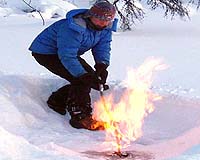 |
Ottawa (AFP) March 15, 2010 Three British explorers set out on a skiing expedition on Monday across 500 kilometers (310 miles) of floating sea ice to investigate rising acid levels in the Arctic Ocean that threaten marine life. The team led by polar explorer Ann Daniels headed northward from a remote staging area in Canada's far north to collect data and samples for the Catlin Arctic Survey, an international scientific mission. Over the next two months, they are to haul sledges weighing up to 120 kilograms (264 pounds) over pressure ridges and rubble fields, and swim across leads of open water, as wind chills push temperatures down to minus 75 Celsius (minus 103 Fahrenheit). Eventually, they will meet up with other scientists who will fly ahead to an "ice base." Results from the expedition will be made available to scientists in Europe, Canada and the United States. "The expedition focus is on ocean acidification which some scientists describe as the Earth's 'other carbon dioxide problem,'" said Daniels in a statement. Although most international attention has focused on the effects of carbon dioxide emissions in pushing up temperatures, scientists believe dangerous levels of ocean acidity are a problem that also needs exploring. But there is scare research on its effects. This expedition is believed to be the first of its kind. Some scientists believe that, based on current projections, the world's oceans' pH could reach levels by 2050 not seen for 20 million years. And if this occurs it may become corrosive to shelled organisms such as lobsters, crabs and oysters. Rising acid levels in sea water reduces the availability of the carbonate mineral -- used by many marine organisms to form their shells. Carbon dioxide is absorbed into cold water more easily than warmer seas, making the Arctic Ocean particularly vulnerable. The Catlin expedition is the second in as many years. In 2009, survey director Pen Hadow led a mission to map out thinning Arctic sea ice as part of a larger study of global warming.
Share This Article With Planet Earth
Related Links Beyond the Ice Age
 Huge methane leak in Arctic Ocean: study
Huge methane leak in Arctic Ocean: studyWashington (AFP) March 4, 2010 Methane is leaking into the atmosphere from unstable permafrost in the Arctic Ocean faster than scientists had thought and could worsen global warming, a study said Thursday. From 2003 to 2008, an international research team led by University of Alaska-Fairbanks scientists Natalia Shakhova and Igor Semiletov surveyed the waters of the East Siberian Arctic Shelf, which covers more than 772,20 ... read more |
|
| The content herein, unless otherwise known to be public domain, are Copyright 1995-2010 - SpaceDaily. AFP and UPI Wire Stories are copyright Agence France-Presse and United Press International. ESA Portal Reports are copyright European Space Agency. All NASA sourced material is public domain. Additional copyrights may apply in whole or part to other bona fide parties. Advertising does not imply endorsement,agreement or approval of any opinions, statements or information provided by SpaceDaily on any Web page published or hosted by SpaceDaily. Privacy Statement |